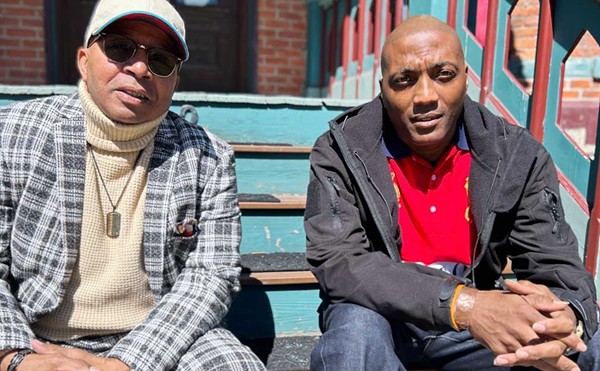Not too long ago I was talking to an intelligent, decent Detroiter who was a member of the Communist Party for decades. Unlike thousands who wised up after the purges or the Prague Spring, he stayed loyal until the fall of the Soviet Union.
That amazed me at first. What, I wondered, were you thinking? How could you be so blind to the repression, the slave labor camps, all of it?
"Well," he said thoughtfully, "I heard and read about those things in the media here, that's true. But the only thing I really knew was that the Communists were the only ones unhesitatingly against segregation. And when I read about local things, like labor issues, that I really knew the truth about, the Detroit papers printed, in many cases, lies.
"So why wouldn't I think they were lying about Russia?"
Which brings us, naturally, to assisted suicide. Recently I spent a night alone in a Lansing-area motel, and by way of erotic refinement, went channel-surfing for political commercials. I saw warm and fuzzy ads that said Gov. John Engler, who seemed to have been wrapped tightly in a spandex girdle, cared about all our citizens. I saw scary black and white ads indicating Jennifer Granholm, Democratic candidate for state attorney general (in real life a soccer mom from Northville) was a lying liberal and the ditzy pawn of the Great Satan Geoffrey Nels Fieger. I learned that the two of them are scheming to release convicted felons in my neighborhood.
But I liked best the spots against the assisted suicide ballot initiative, which were cleverly done. "Proposal B is bad legislation," a voice like Mort Crim's on Quaaludes, intoned. I found myself nodding soberly. Why would anyone want to think for themselves when they can get Right-to-Life to do it for them? One radio spot is truly worthy of the thought police; it says Proposal B "limits freedom of choice."
What sort of ads, I wondered, would those actually supporting free choice in this most personal of matters run? The answer came very quickly: none. The small band of warriors known as Merian's Friends (after an early Kevorkian patient) exhausted their limited financial resources in managing, against all odds, to get on the ballot.
They are a patchwork group led by Ann Arbor's Ed Pierce, a physician and long-ago state senator, and (until she was pushed aside) Carol Poenisch, daughter of Merian Frederick, that early Kevorkian patient. Success was harder than you'd think; it meant gathering around 350,000 signatures, many of which they had to pay professionals to collect. Kevorkian failed miserably to get a suicide vote four years ago, when the issue was hotter and people more excited about killing themselves.
But getting there shot their financial wad, and the antis, thanks to Mother Church and the usual right-wing lobbying groups, have millions. This means, according to the conventional wisdom, that while polls still show solid, though shrinking support for Proposal B, it doesn't have a prayer.
Which would be a tragedy. Not that I am greatly fond of the Merian's Friends crowd, who seem as narrow and brittle as any of the players in the now old-hat suicide wars. Last year, when I wrote a generally polite column questioning the wisdom of some of their tactics (insisting on a 12,000-word proposal, and picking senseless fights with Kevorkian) their press spokesman complained to my editor.
I was then attacked by another of their stalwarts who angrily called me and said, "Why don't you just admit that you want us to lose?" But while I indeed do not want to go to the beach with any of these people, I do want them to win.
Proposal B, despite the lies of its opponents, is sensible, moderate, and totally sane. It is limited to those who fit the absurd artificial category of "terminally ill," which in this case means, certified as having six months or less to live.
Such patients, once they follow a set of procedures and are certified sane by a psychiatrist, are given prescription drugs they have to take themselves. Now one can nitpick all sorts of things. Kevorkian, for example, points out that many terminally ill persons can't take the drugs on their own, and risk only doing a partial job and leaving themselves worse off than before. He opposes Proposal B, mostly on the grounds that this is an inherent human right, that only doctors can determine the rules for a medical procedure, and no law is needed at all, yadayadayada.
Still, there are lots of terminally ill people whose pain can't be relieved by medication and who can't find a courageous, compassionate doctor to help them out. The only alternative does have guts, possibly more guts than sense, but is an aging lone ranger (70) and sooner or later will unhook his machine for the last time.
Every poll has shown a solid majority of the people want this right, even if they aren't sure they'll use it. Maybe, just maybe, they will see through the crap on the airwaves; they did, after all, in Oregon. Possibly they might even listen to a Republican, former Gov. William Milliken. "Citizens should be allowed to make end of life decisions according to their own religious and moral beliefs, not those of others." That's what it is really about, no matter what lies are told.





